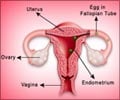Infertile couples have yet another reason to smile for researchers have identified a gene that plays a crucial role in regulating and blocking ovulation, opening up the avenues for
Infertile couples have yet another reason to smile for researchers have identified a gene that plays a crucial role in regulating and blocking ovulation, opening up the avenues for developing new medications that may help them in producing children.
A team of Canadian and European researchers have identified a gene called Lrh1 with the potential to both regulate and block ovulation."Our findings demonstrate that the Lrh1 gene is essential in regulating ovulation," said Bruce D. Murphy, director the Animal Research Centre at the Faculty of Veterinary Medicine and an adjunct professor of and obstetrics and gynaecology at the Faculty of Medicine of the Universite de Montreal.
"Until this point, the role of Lrh1 in female fertility was unclear, but we have found the gene regulates multiple mechanisms of ovulation and may affect fertilization.
"This is an important development, since 15 percent of couples are infertile.
"The widespread role of this gene in the ovary indicates that it may be targeted to stimulate ovulation and, eventually, conception," he added.
Since Lrh1 gene also plays a critical role in blocking ovulation, the discovery has opened up the possibility of developing new contraceptives for effective birth control.
Advertisement
"This discovery means we can envision new contraceptives that selectively stop ovulation," said Murphy.
Advertisement
The new study is published in the latest issue of the journal Genes and Development.
Source-ANI
SRM









